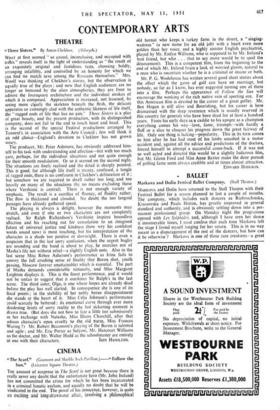CONTEMPORARY ARTS
THEATRE
"Three Sisters." By Anton Chekhov. (Aldwych.) WHAT at first seemed "so casual, inconclusive, and occupied with trifles" reveals itself in the light of understanding as "the result of an exquisitely original and fastidious taste, choosing boldly, arranging infallibly, and controlled by an honesty for which we can find no match save among the Russians themselves." Mrs. Woolf was thinking of Chekhov's stories, but the observation is equally true of the plays ; and now that English audiences are no longer so bemused by the alien atmospherics, they are freer to admire the foursquare architecture and the individual strokes of which it is composed. Appreciation is increased, not lessened, by seeing more clearly the skeleton beneath the flesh, the delicate apparatus so cunningly clad with the authentic likeness of life itself, the "ragged ends of life that has no aim." Three Sisters is a play of great beauty, and the present production, with its distinguished company, does not fail in the end to touch heart and head. This is the second of the special Festival productions arranged by Tennent's in association with the Arts Council ; few will think it an odd choice—England's devotion to Chekhov has not grown weary.
The producer, Mr. Peter Ashmore, has obviously addressed him- self to his task with understanding and affection—but with too much care, perhaps, for the individual situations and not quite enough for their smooth modulation. Or so it seemed on the second night. The situations are finely realised and the detail is sharply pointed. This is good, for although life itself is muzzy, confused, a tangle of ragged ends, there is no confusion in Chekhov's delineation of it ; but somehow we are required to dwell rather too long and too heavily on many of the situations (by no means excluding those where Vershinin is central). There is not enough variety of emphasis. The result is a sacrifice of fluency, of fluidity rather. The flow is thickened and clouded. No doubt the too languid passages have already gathered speed.
The playing is always a delight, however the moments may stretch, and even if one or two characters are not completely realised. Sir Ralph Richardson's Vershinin inspires boundless affection and his reaching out for consolation to an imagined future of universal justice and kindness (how wry his confident words sound now) is most touching, but his interpretation of the character is a shade too positive or downright. There is even a suspicion that in the last sorry confusion, when the urgent bugles are sounding and the band is about to play, he marches out of Masha's life not without relief—a slightly English note. Also in the last scene Miss Ratee Asherson's performance as Irina fails to convey the full crushing sense of finality (her Baron shot, youth passing, Moscow forever unattainable) which is essential. The part of Masha demands considerable virtuosity, and Miss Margaret Leighton displays it. This is the finest performance, and it would not be unfair to suggest that it outshines Sir Ralph's in the last scene. The third sister, Olga, is one whose hopes are already dead before the play has well started. In consequence she is one of its fixed points ; in the stability of her nobly borne disappointment she stands at the heart of it. Miss Celia Johnson's performance could scarcely be bettered ; its emotional curve through ever more deadening levels of sorry reality to the last sickening moment is drawn true. (But does she not bow to fate a little too submissively in her exchange with Natasha, Miss Diana Churchill, after that odious character's open cruelty to the old nurse, Miss Frances Waring ?) Mr. Robert Beaumont's playing of the Baron is talented and agile ; and Mr. Eric Porter as Solyoni, Mr. Harcourt Williams as the doctor, and Mr. Walter Hudd as the schoolmaster are entirely


































 Previous page
Previous page